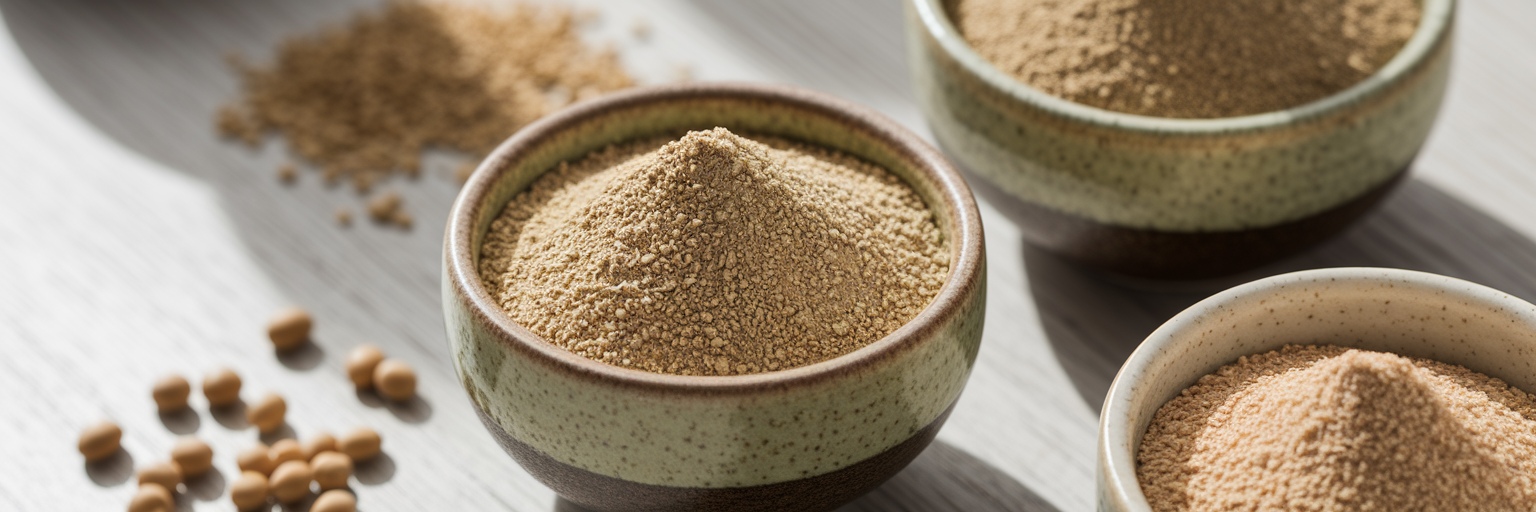The Common Protein Powder Problem: Digestive Discomfort
If you've ever finished a protein shake only to feel bloated, gassy, or just generally uncomfortable, you are definitely not alone. It’s a frustrating experience when you’re trying to do something good for your body. For many people, the source of this digestive trouble is the protein itself, specifically dairy-based proteins like whey and casein. The main culprit is often lactose, a sugar found in milk that can be difficult for many adults to digest.
Even if you don't have a formal lactose intolerance diagnosis, your body might still have a sensitivity to it. This can lead to that familiar stomach cramping and bloating that ruins your post-workout high. It’s a common enough issue that many people just assume it's a necessary evil of protein supplements. But what if it isn't?
This is where plant-based protein powders come in. They offer a powerful and effective way to meet your protein needs without the digestive distress. A high-quality vegan protein for sensitive stomachs is not just an alternative for vegans; it's a solution for anyone who wants to support their fitness goals while keeping their gut happy. It’s about choosing a protein that works with your body, not against it.
The Fiber Advantage in Plant-Based Proteins

One of the biggest differences between dairy and plant proteins lies in a single, powerful nutrient: fiber. Think of dietary fiber as the traffic controller for your digestive system. It helps keep everything moving at the right pace, ensuring regularity and preventing that backed-up feeling. Plant-based protein sources like pea, hemp, and brown rice are naturally rich in this nutrient, something completely absent in whey or casein.
A single serving of a well-formulated high fiber protein powder can provide up to five grams of fiber, which is a significant step toward your daily needs. This is a key factor when it comes to plant based protein and digestion. But the benefits go beyond just keeping you regular. This fiber also acts as a prebiotic, feeding the beneficial bacteria that live in your gut. A healthy gut microbiome is essential for everything from nutrient absorption to immune function.
So, what exactly does this fiber do for you?
- Adds bulk to stool, which is crucial for preventing constipation.
- Slows down digestion, helping you feel fuller for longer and stabilizing blood sugar levels.
- Feeds beneficial gut bacteria, supporting a healthy and balanced microbiome.
Choosing between different plant protein sources can depend on your personal preferences and fitness goals. To help you find the right fit, we've created a guide to some of the best protein powders available for various needs.
Hydration Is Key for a Happy Gut
So, does vegan protein cause constipation? It’s a fair question, especially when you hear about its high fiber content. The answer is generally no, but with one very important condition: you must stay hydrated. Think of fiber as a sponge. For it to become soft, bulky, and do its job effectively, it needs to absorb water. Without enough liquid, that same fiber can actually have the opposite effect, leading to discomfort and slowing things down.
This is why hydration is non-negotiable when you’re using a fiber-rich protein powder. The solution is incredibly simple yet powerful. Make it a habit to drink a full 8-ounce glass of water with your protein shake, in addition to your regular daily water intake. This simple step ensures the fiber can work its magic, promoting smooth and comfortable digestion.
This isn't just friendly advice; it's backed by solid health principles. As health experts at the Mayo Clinic consistently emphasize, adequate fluid intake is critical when increasing fiber consumption to support digestive health. When you combine the fiber in your vegan protein with plenty of water, you create the perfect synergy for a happy gut.
Choosing Ingredients That Boost Gut Health

A truly great vegan protein powder goes beyond just protein and fiber. The best formulas are designed as comprehensive wellness tools, incorporating additional ingredients specifically chosen to support your digestive system. When you're looking for the best protein powder for gut health, here are a few key components to look for on the label.
Prebiotics: The Fuel for Good Bacteria
Prebiotics are special types of fiber that your good gut bacteria love to eat. Think of them as fertilizer for your internal garden. Ingredients like inulin or chicory root fiber are excellent prebiotics that help your beneficial bacteria thrive, which in turn supports a balanced and healthy gut environment.
Digestive Enzymes: The Absorption Boosters
Sometimes your body can use a little help breaking down nutrients. Digestive enzymes, such as protease (which breaks down protein) and amylase (which breaks down carbohydrates), can ease the digestive burden. By helping to break down the food you eat more efficiently, these enzymes can reduce the chances of bloating and ensure you get the maximum nutritional value from your shake.
Probiotics: The Good Guys Themselves
Probiotics are the live beneficial bacteria that directly contribute to a healthy gut population. While less common in shelf-stable powders, some advanced formulas include resilient strains of probiotics to give your microbiome a direct boost. A powder that combines these elements, like our Chocolate Vegan Protein, is designed for both performance and digestive comfort. If you're curious about other wellness-focused supplements, you can explore all our offerings here.
| Feature | Typical Dairy Protein (Whey/Casein) | Vegan Protein with Gut-Support |
|---|---|---|
| Common Irritant | Lactose | None (naturally lactose-free) |
| Natural Fiber Content | None | Often 3-5g per serving |
| Gut-Friendly Additives | Rarely included | Often fortified with prebiotics, probiotics, and digestive enzymes |
| Common Digestive Experience | Can cause bloating, gas, or discomfort | Designed to be gentle and support smooth digestion |
Note: This table compares general product categories. Individual formulations may vary.
Making Your Vegan Protein Work for You
Switching to a vegan protein powder can be a fantastic move for your digestive health, and finding the right one is easier than ever. The days of gritty, chalky plant proteins are long gone. Modern formulas are smooth, delicious, and packed with benefits. To help you choose with confidence, here is a simple checklist to keep in mind:
- Check the Protein Source: Look for a simple source like pea protein or a blend of different plant proteins. The key is to find one that you enjoy and that agrees with your system.
- Verify the Fiber Content: Aim for a powder with at least 3 grams of fiber per serving. This is a good indicator that it will support digestive regularity.
- Scan for Added Goodness: Check the ingredient list for gut-friendly extras like prebiotics or digestive enzymes. These additions show that the product is designed with digestive wellness in mind.
- Consider Taste and Texture: You have to enjoy drinking it! Don't be afraid to try a few different brands or flavors to find your perfect match.
The most important thing is to listen to your body. Start with a smaller serving if you're new to vegan protein or high-fiber supplements, and see how you feel. Once you find a powder you love, you can get creative with it! For some inspiration, check out these easy and delicious vegan protein recipes.
If you found this helpful, share it with a friend who might be struggling with their current protein powder!



